Int'l media on Kosovo elections: Albanians disappointed
Foreign media see Saturday's ballot in Kosovo as proof that voters there are "disappointed".
Monday, 19.11.2007.
12:10

Foreign media see Saturday's ballot in Kosovo as proof that voters there are "disappointed". And while the UK and U.S. agencies produced moderately pessimistic reports, the German newspapers paint a distinctly grim picture of the province's present and future. Int'l media on Kosovo elections: Albanians disappointed More than half of those eligible to vote stayed at home, despite the fact that party leaders they had an option to support with votes said they would declare Kosovo's independence in a matter of moths, Reuters reported. But local analyst Dugadin Gorani told the agency that the campaign was not about independence, "rather it was about Kosovo residents' well-being", adding that they felt the consequences of bad management and neglect. The record low turnout of under 45 percent is no surprise, according to Gorani. "I was afraid it would be under 30 percent. People are deeply disappointed." Reuters interprets this as an indicator that the independence euphoria has already in a way been extinguished, adding that many in Kosovo see the province controlled by political opportunists who cannot bring significant changes. The agency adds that even in case of a speedy international recognition of independence, situation in Kosovo "could get worse before its gets better" with Serbia that could "block trade, borders, power supplies, phone lines and anything else it influences." The Associated Press opted for a portrait of the Democratic Party of Kosovo leader and likely new prime minister, Hashim Thaci, formerly a member of the Kosovo Liberation Army (KLA). As prime minister, Thaci said he would declare Kosovo independent "immediately" after December 10, the UN deadline for international mediators trying to negotiate a settlement between Pristina and Belgrade. "If official results from this weekend's elections confirm his party's victory, it will be the first time ethnic Albanians have trusted a party run by a former guerrilla to run the province," the agency said. But German newspapers write today that the weekend ballot in Kosovo will not mark the start of a more stable era in the province, and question whether it can be viewed as proof of a democratic progress. Die Welt says that "these elections are not the end of the Kosovo crisis, but only a passage toward heavy conflict that can also be bloody, and whose consequences will not be limited to the Balkans." The newspaper describes Thaci's DPK as "militant", and points out that the only point of agreement with the moderate Democratic Alliance of Kosovo seems to be that both parties believe Kosovo should declare independence after December 10. "If afterwards northern, Serb-inhabited Kosovo separates, there will be an outbreak of violence that has shown its destructive force after 1991 and which could only be curbed from the outside – also by use of force," Die Welt believes. The daily also wonders whether the EU and NATO are ready for such an outcome, asking "where the front line will be," saying that the Republic of Srpska would separate from Bosnia, "where peace has never really been more than a ceasefire." Frankfurter Rundschau writes that it would be "too early to see the Kosovo elections result as a triumph of a stable democracy, as Western diplomats are saying." "Kosovo is not a democracy at all. The power is not with the people but with international diplomats. Elections there imitate means of a democratic sharing of power," the daily claims. "The parties have no political profile and it is hard to tell how they intend to rule the land they wish to 'liberate'. No wonder the turnout was below 45 percent," Frankfurter Rundschau adds. "Thaci's DPK, especially in the Drenica region, is a client party with mafia overtones. Former KLA commanders still call the shots there and manage to win 90 percent of votes in a suspicious manner. Thaci has tried to do some things to suppress them, but he has not quite succeeded." "The semi-criminal, semi-extremist scene in the northern and southern border areas has at least indirect contacts with the DPK. In other words, the new king must now deal with more than just one Falstaff," the daily says. Sueddeutsche Zeitung believes that "there may be some hope that Thaci has learned from his past mistakes, when he was punished in several elections due to the smug appearance of his desperados, who after the war in Kosovo looted shops and hunted down Serbs." The paper adds that Thaci could provide a turning point for a better future "only if the EU manages to quickly solve the status issue and goes ahead with its planned mission in Kosovo." Expectedly, the Russian press is even less kind this Monday as it looks at the personality of the winner of the Kosovo elections, pointing out that he is "a former commander of ethnic Albanian extremists and a man whose nickname is - Snake." The official Rossiskaya Gazeta daily in a story headlined "Snake sheds skin", says that the results of the elections could have been predicted. The newspaper adds that developments in the early 1990s in the former Yugoslavia completely changed Thaci's life and that he rose "from a little known leader of a group of KLA extremists, which spilled much Serbian blood, to the pinnacle of power." At the end of the story Rossiskaya Gazeta recalled that the former Kosovo Albanian premier in exile, Bujar Bukoshi, once said that "corpses were never an obstacle to Thaci's career." RosBusinessConsulting's RBK Daily reported that Thaci's coalition partner will, by all accounts, be the Democratic Alliance of Kosovo, whose leader is also Kosovo's President Fatmir Sejdiu. The daily said that "according to the Serbian special services, Thaci got his nickname after he personally took part in the killing of the Serbs in the central part of Kosovo." "There is evidence of Thaci's direct participation, as well as that of his party officials, in human trafficking, narcotics and arms trade," RBK daily alleges. Votes counted in Kosovo elections (FoNet)
Int'l media on Kosovo elections: Albanians disappointed
More than half of those eligible to vote stayed at home, despite the fact that party leaders they had an option to support with votes said they would declare Kosovo's independence in a matter of moths, Reuters reported.But local analyst Dugadin Gorani told the agency that the campaign was not about independence, "rather it was about Kosovo residents' well-being", adding that they felt the consequences of bad management and neglect.
The record low turnout of under 45 percent is no surprise, according to Gorani.
"I was afraid it would be under 30 percent. People are deeply disappointed."
Reuters interprets this as an indicator that the independence euphoria has already in a way been extinguished, adding that many in Kosovo see the province controlled by political opportunists who cannot bring significant changes.
The agency adds that even in case of a speedy international recognition of independence, situation in Kosovo "could get worse before its gets better" with Serbia that could "block trade, borders, power supplies, phone lines and anything else it influences."
The Associated Press opted for a portrait of the Democratic Party of Kosovo leader and likely new prime minister, Hashim Thaci, formerly a member of the Kosovo Liberation Army (KLA).
As prime minister, Thaci said he would declare Kosovo independent "immediately" after December 10, the UN deadline for international mediators trying to negotiate a settlement between Priština and Belgrade.
"If official results from this weekend's elections confirm his party's victory, it will be the first time ethnic Albanians have trusted a party run by a former guerrilla to run the province," the agency said.
But German newspapers write today that the weekend ballot in Kosovo will not mark the start of a more stable era in the province, and question whether it can be viewed as proof of a democratic progress.
Die Welt says that "these elections are not the end of the Kosovo crisis, but only a passage toward heavy conflict that can also be bloody, and whose consequences will not be limited to the Balkans."
The newspaper describes Thaci's DPK as "militant", and points out that the only point of agreement with the moderate Democratic Alliance of Kosovo seems to be that both parties believe Kosovo should declare independence after December 10.
"If afterwards northern, Serb-inhabited Kosovo separates, there will be an outbreak of violence that has shown its destructive force after 1991 and which could only be curbed from the outside – also by use of force," Die Welt believes.
The daily also wonders whether the EU and NATO are ready for such an outcome, asking "where the front line will be," saying that the Republic of Srpska would separate from Bosnia, "where peace has never really been more than a ceasefire."
Frankfurter Rundschau writes that it would be "too early to see the Kosovo elections result as a triumph of a stable democracy, as Western diplomats are saying."
"Kosovo is not a democracy at all. The power is not with the people but with international diplomats. Elections there imitate means of a democratic sharing of power," the daily claims.
"The parties have no political profile and it is hard to tell how they intend to rule the land they wish to 'liberate'. No wonder the turnout was below 45 percent," Frankfurter Rundschau adds.
"Thaci's DPK, especially in the Drenica region, is a client party with mafia overtones. Former KLA commanders still call the shots there and manage to win 90 percent of votes in a suspicious manner. Thaci has tried to do some things to suppress them, but he has not quite succeeded."
"The semi-criminal, semi-extremist scene in the northern and southern border areas has at least indirect contacts with the DPK. In other words, the new king must now deal with more than just one Falstaff," the daily says.
Sueddeutsche Zeitung believes that "there may be some hope that Thaci has learned from his past mistakes, when he was punished in several elections due to the smug appearance of his desperados, who after the war in Kosovo looted shops and hunted down Serbs."
The paper adds that Thaci could provide a turning point for a better future "only if the EU manages to quickly solve the status issue and goes ahead with its planned mission in Kosovo."
Expectedly, the Russian press is even less kind this Monday as it looks at the personality of the winner of the Kosovo elections, pointing out that he is "a former commander of ethnic Albanian extremists and a man whose nickname is - Snake."
The official Rossiskaya Gazeta daily in a story headlined "Snake sheds skin", says that the results of the elections could have been predicted.
The newspaper adds that developments in the early 1990s in the former Yugoslavia completely changed Thaci's life and that he rose "from a little known leader of a group of KLA extremists, which spilled much Serbian blood, to the pinnacle of power."
At the end of the story Rossiskaya Gazeta recalled that the former Kosovo Albanian premier in exile, Bujar Bukoshi, once said that "corpses were never an obstacle to Thaci's career."
RosBusinessConsulting's RBK Daily reported that Thaci's coalition partner will, by all accounts, be the Democratic Alliance of Kosovo, whose leader is also Kosovo's President Fatmir Sejdiu.
The daily said that "according to the Serbian special services, Thaci got his nickname after he personally took part in the killing of the Serbs in the central part of Kosovo."
"There is evidence of Thaci's direct participation, as well as that of his party officials, in human trafficking, narcotics and arms trade," RBK daily alleges.


























































Komentari 28
Pogledaj komentare